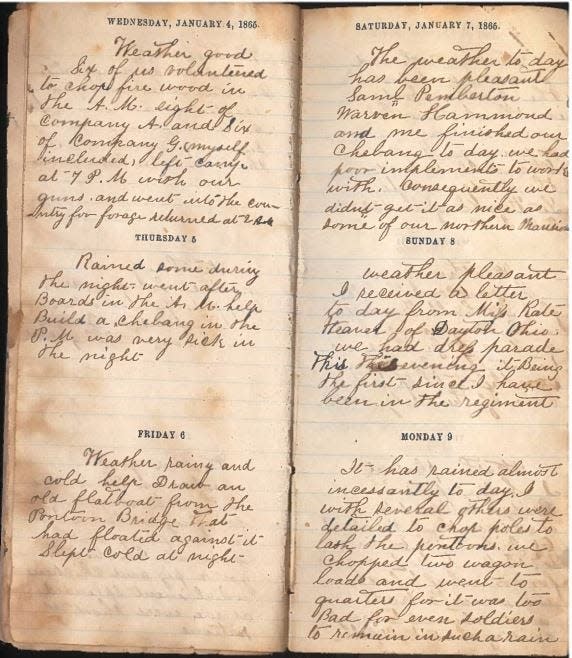Veterans Column: Cook's diary shares details from Civil War front lines
Charles A. Cook was born in Licking County on March 15, 1844. He was 17-years-old when he enlisted to fight in the Civil War on Jan. 20, 1862.
He served with Company C of the 76th Ohio Volunteer Infantry until his enlistment was over on Jan. 24, 1864. At that time having already been with his unit through the battles of Fort Donelson, Shiloh, Corinth, Arkansas Post, Vicksburg, Canton, Jackson, Lookout Mountain, Mission Ridge, and Ringgold Gap, he chose not to reenlist in the 76th. On June 25, 1864, Cook continued his service and enlisted with Company G of the 1st Veteran Volunteer Engineers. These men were tasked with repairing railroads, building block houses and bridges, and other general engineering duties for the army.

The descendants of Cook have a diary that he kept. The small black cover was stamped 1865 and was marked inside with each date. In the back, there was a ledger that one could keep track of their finances by day as well as a calendar of the year. Cook remarked on Feb. 1, 1865 that he “bought this diary.” At the time he was stationed in Chattanooga, Tennessee. However, the diary has detailed entries from January 1, which leads us to believe he was keeping another diary and then just entered the details from that one to this one. His entries are mostly 3-4 sentences and center on the weather, his job for the day, what letters he received or wrote, and his health. Some might think this has no historical value, but they would be mistaken. There is very little online when researching his unit, so any information in his diary is helpful as to their movements and what they were doing. The other part, as you will see, is reading what the common soldier was thinking as the end of the Civil War approached in the coming months.
The diary began that January with Cook arriving opposite Decatur, Alabama, it is here that they are tasked with maintaining a bridge over the Tennessee, River. He stayed here until Jan. 30 when they were sent to Chattanooga, where he purchased the diary. For the next few days, he sat and did nothing. According to his entry on Feb. 3; “Weather cool with some rain. I cleaned my gun in the A.M. nothing in the P.M. worth mentioning. Health tolerable good.” On Feb. 7, it snowed heavily and they began work on a blockhouse, but according to Cook the ground was warm so it ended up just “very muddy”. Throughout the rest of February, he hauled lumber for the blockhouse through cloudy and rainy conditions. By Feb. 27, it had rained so much that the camp was flooding. The rain stopped however, and the creek “commenced falling” the next day. On March 4, he reported, “Weather cloudy, I was on guard last night. Between 8 and 11 it rained very hard while I was on duty. The president of the United States retaken his seat today.”
Abraham Lincoln had begun his second term in office. By March 5th, they had to “evacuate their quarters’ because of the rising floodwaters. Fortunately, for Carter on March 11, they left Chattanooga for a new job on the Duck River in Tennessee. They arrived there on March 18 and he noted: “Weather windy we left Carter Creek this morning and marched about 8 miles and camped near Duck River. Was on guard last night and today. This is a much pleasanter place than Chattanooga”. On March 15 he mentioned, “I am twenty-one years old today.”
He had been a soldier now for four years but his army days weren’t over yet and an occurrence after the war would bring Charles Cook national and international fame.
Doug Stout is the Veterans Project Coordinator for the Licking County Library. You may contact him at 740-349-5571 or dstout@lickingcountylibrary.org. His book "Never Forgotten: The Stories of Licking County Veterans" is available for purchase at the library or online at bookbaby.com & Amazon.com
This article originally appeared on Newark Advocate: Veterans Column: Cook's diary shares details from Civil War front
